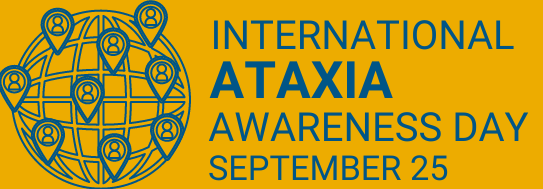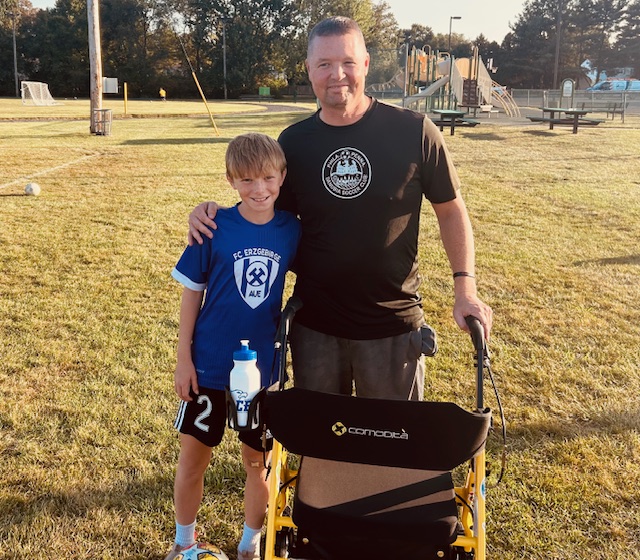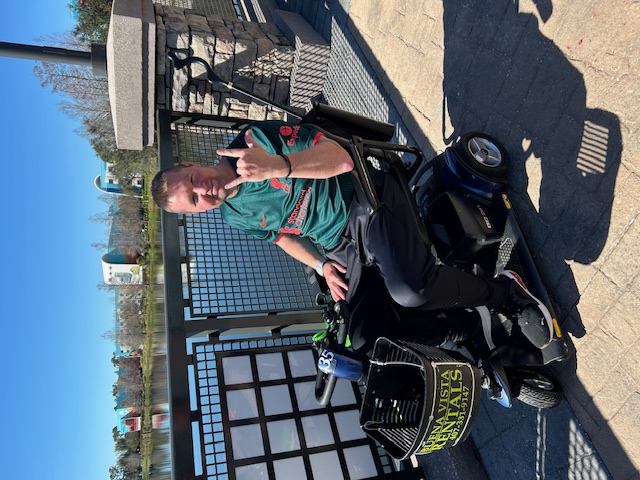Embracing Adaptability: Lessons on Living with Ataxia
Three weeks before International Ataxia Awareness Day (IAAD), I received my ataxia diagnosis. As IAAD approaches, I want to share the valuable lessons I’ve learned from living with a disability and how these insights might benefit you.

I do not recommend living with a disability.
Daily life, on good days, can be a constant exercise in frustration, while on bad days, it can feel downright soul-crushing.
However, if you find yourself navigating life with a disability, take solace in knowing that this journey imparts invaluable lessons. Much like a highly effective yet tough, no nonsense teacher, living with a disability—though far from the life you might have imagined—offers unique opportunities for adaptability. I’ve learned, sometimes from that very unlikeable teacher, that embracing these challenges can lead to profound personal growth and resilience.
The History Behind International Ataxia Day
International Ataxia Day, observed on September 25 each year, is dedicated to raising awareness about ataxia—a neurological disorder characterized by a lack of voluntary coordination of muscle movements. This global event aims to increase understanding, support research, and advocate for those affected by this debilitating condition.
When I was first diagnosed with ataxia, I had never heard of it. I didn’t realize it was a condition with a global presence. I thought it might be a side effect of swimming in the Delaware River as a kid.
The concept of an International Ataxia Day originated from the collaborative efforts of ataxia advocacy groups and organizations worldwide. The day was established to provide a unified platform for raising awareness about ataxia. Also, the day serves multiple purposes: educating the public, fostering empathy and understanding, supporting research, and encouraging community involvement.
Since 2020, I’ve founded the Philadelphia Ataxia Support Group, collaborated with the University of Pennsylvania to advance patient advocacy, and host fundraising events to support ataxia research.
If you enjoy my blog and books, and would like to donate to make a direct impact on the lives of people with ataxia click here.

Embracing Adaptability
I once overheard someone say that as people get older, they become more stubborn and resistant to change. I didn’t believe it at the time—and if it were true, I was certain it wouldn’t apply to me. However, I’ve recently come to realize how accurate that observation can be. To my surprise, it has indeed happened to me.
Daily life with ataxia often requires sudden change and quick thinking adaptability. And I’ve learned that adaptability isn’t just about overcoming physical barriers; it’s about rethinking how you approach every facet of your life. The constant need to adjust and adapt builds a resilience that extends beyond managing physical limitations.
I recently began coaching my youngest son, Dylan, and his soccer team. I did this for two reasons:
1. I had never coached my youngest son in any sport and–because kids do a strange thing and age–the opportunity to do so was fading with every passing day.
2. I needed to prove to myself that, despite my disability, I am still able.
For nearly 20 years, being a able-bodied coach was a core part of my identity. Then, I got sick and had to do the tricky work of redefining myself while staying true to who I am. Coaching now means relying on an all-terrain walker to move up and down the field. I’ll admit, I initially felt unsure, self-conscious, and embarrassed about using a walker in such a visible setting often associated for people that don’t need help walking. There was nowhere to hide. I was voluntarily exposing myself to stares, opinions, and judgments.
I wish I could tell you the decision to return to coaching came easily, fearlessly, and without consternation. It did not.

A terribly hard lesson to learn, living with a disability has taught me that facing challenges head-on and actively seeking solutions is crucial to how I define myself. Although the journey is tough, it teaches profound lessons about adaptability. Us old folks need to realize, the ability to continuously adapt and find innovative solutions helps build a strong foundation for overcoming various life challenges. I’ve come to understand that adaptability is more than just a useful trait—it’s a vital component of a fulfilling life.
Even if you don’t have ataxia, a youthful embrace of adaptability can turn challenges into opportunities for growth, making life not only more manageable but also rich with possibilities.
And, no matter your age, I believe adaptability can do the same for anyone willing to embrace its power.
Be well,
Jay
Again, if you enjoy my books and blog and would like to donate to make a direct impact on the lives of people with ataxia click here.


Are you writer? Are you looking for writing advice or writing tactics that you can help guide you on your writing journey?
One, Line, One Love: Episode 35: A Creative Conversation Between Two Everyday Writers
In this episode of “One Line, One Love,” Gail and Jay dive into a compelling quote from Steven Pressfield’s The War of Art. Pressfield cautions us to be wary of writing workshops or what he calls, “boondoggles of resistance.” Gail and Jay reflect on their personal experiences with writing workshops and share valuable advice on how to handle sharing early drafts of your work to an audience. If you’re a writer seeking how to seek constructive criticism to refine your craft, this episode is a must-listen!

Book Sale Link
~~
Warm greetings to everyone who found me on the University of Pennsylvania’s Ataxia Clinic’s website! Thanks for stopping by. I have ataxia and though I’m not a doctor, I hope my words comfort, encourage, empower, and serve as good company on your journey.

~~
Jay Armstrong is a speaker and an award-winning author. Despite being diagnosed with a rare neurological disease, that impairs his movement, balance, eyesight, and speech–Jay presses on. The leader of the Philadelphia Ataxia Support Group, he hopes to help you find joy, peace, and meaning in life.





